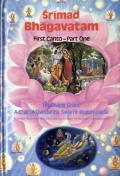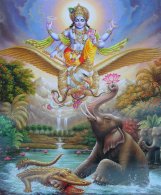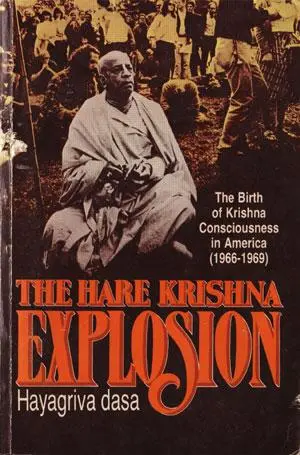For some reason this Purport from the First Canto of the Srimad-Bhagavatam caught my attention this morning. I generally do not put much thought into the Zodiac, or stellar influences upon us, or how the laws of nature are controlling us at every moment. But in this purport by Srila Prabhupada, he mentions the importance of preforming pious acts to take advantage of good stellar influences. “Suitable arrangement of astral influences is never a creation of man’s will, but is the arrangement of the superior management of the agency of the Supreme Lord. Of course, the arrangement is made according to the good or bad deeds of the living being. Herein lies the importance of pious acts performed by the living being. Only by pious acts can one be allowed to get good wealth, good education and beautiful features.” (Purport Srimad-Bhagavatam 1.12.12)
Astronomical calculations of stellar influences upon a living being are not suppositions, but are factual, as confirmed inŚrīmad-Bhāgavatam. Every living being is controlled by the laws of nature at every minute, just as a citizen is controlled by the influence of the state. The state laws are grossly observed, but the laws of material nature, being subtle to our gross understanding, cannot be experienced grossly. As stated in the Bhagavad-gītā (3.9), every action of life produces another reaction, which is binding upon us, and only those who are acting on behalf of Yajña (Viṣṇu) are not bound by reactions. Our actions are judged by the higher authorities, the agents of the Lord, and thus we are awarded bodies according to our activities. The law of nature is so subtle that every part of our body is influenced by the respective stars, and a living being obtains his working body to fulfill his terms of imprisonment by the manipulation of such astronomical influence. A man’s destiny is therefore ascertained by the birthtime constellation of stars, and a factual horoscope is made by a learned astrologer. It is a great science, and misuse of a science does not make it useless… (Purport Srimad-Bhagavatam 1.12.12)
Śrīmad-Bhāgavatam
By His Divine Grace A. C. Bhaktivedanta Swami Prabhupāda
Canto One, Chapter 12, Text 12
tataḥ—thereupon; sarva—all; guṇa—good signs; udarke—having gradually evolved; sa-anukūla—all favorable;grahodaye—constellation of stellar influence; jajñe—took birth; vaṁśa-dharaḥ—heir apparent; pāṇḍoḥ—of Pāṇḍu;bhūyaḥ—being; pāṇḍuḥ iva—exactly like Pāṇḍu; ojasā—by prowess.
Thereupon, when all the good signs of the zodiac gradually evolved, the heir apparent of Pāṇḍu, who would be exactly like him in prowess, took birth.
Astronomical calculations of stellar influences upon a living being are not suppositions, but are factual, as confirmed inŚrīmad-Bhāgavatam. Every living being is controlled by the laws of nature at every minute, just as a citizen is controlled by the influence of the state. The state laws are grossly observed, but the laws of material nature, being subtle to our gross understanding, cannot be experienced grossly. As stated in the Bhagavad-gītā (3.9), every action of life produces another reaction, which is binding upon us, and only those who are acting on behalf of Yajña (Viṣṇu) are not bound by reactions. Our actions are judged by the higher authorities, the agents of the Lord, and thus we are awarded bodies according to our activities. The law of nature is so subtle that every part of our body is influenced by the respective stars, and a living being obtains his working body to fulfill his terms of imprisonment by the manipulation of such astronomical influence. A man’s destiny is therefore ascertained by the birthtime constellation of stars, and a factual horoscope is made by a learned astrologer. It is a great science, and misuse of a science does not make it useless. Mahārāja Parīkṣit or even the Personality of Godhead appear in certain constellations of good stars, and thus the influence is exerted upon the body thus born at an auspicious moment. The most auspicious constellation of stars takes place during the appearance of the Lord in this material world, and it is specifically called jayantī, a word not to be abused for any other purposes. Mahārāja Parīkṣit was not only a great kṣatriya emperor, but also a great devotee of the Lord. Thus he cannot take his birth at any inauspicious moment. As a proper place and time is selected to receive a respectable personage, so also to receive such a personality as Mahārāja Parīkṣit, who was especially cared for by the Supreme Lord, a suitable moment is chosen when all good stars assembled together to exert their influence upon the King. Thus he took his birth just to be known as the great hero of Śrīmad-Bhāgavatam. This suitable arrangement of astral influences is never a creation of man’s will, but is the arrangement of the superior management of the agency of the Supreme Lord. Of course, the arrangement is made according to the good or bad deeds of the living being. Herein lies the importance of pious acts performed by the living being. Only by pious acts can one be allowed to get good wealth, good education and beautiful features. Thesaṁskāras of the school of sanātana-dharma (man’s eternal engagement) are highly suitable for creating an atmosphere for taking advantage of good stellar influences, and therefore garbhādhāna-saṁskāra, or the first seedling purificatory process prescribed for the higher castes, is the beginning of all pious acts to receive a good pious and intelligent class of men in human society. There will be peace and prosperity in the world due to good and sane population only; there is hell and disturbance only because of the unwanted, insane populace addicted to sex indulgence.
Bhagavad-gītā As It Is
By His Divine Grace A. C. Bhaktivedanta Swami Prabhupāda
Chapter 3, Text 9
yajña-arthāt—only for the sake of Yajña, or Viṣṇu; karmaṇaḥ—work done; anyatra—otherwise; lokaḥ—this world; ayam—this; karma-bandhanaḥ—bondage by work; tat—Him;artham—for the sake of; karma—work; kaunteya—O son of Kuntī; mukta-saṅgaḥ—liberated from association; samācara—do it perfectly.
Work done as a sacrifice for Viṣṇu has to be performed, otherwise work binds one to this material world. Therefore, O son of Kuntī, perform your prescribed duties for His satisfaction, and in that way you will always remain unattached and free from bondage.
Since one has to work even for the simple maintenance of the body, the prescribed duties for a particular social position and quality are so made that that purpose can be fulfilled. Yajña means Lord Viṣṇu, or sacrificial performances. All sacrificial performances also are meant for the satisfaction of Lord Viṣṇu. The Vedas enjoin: yajño vai viṣṇuḥ. In other words, the same purpose is served whether one performs prescribed yajñas or directly serves Lord Viṣṇu. Kṛṣṇa consciousness is therefore performance of yajña as it is prescribed in this verse. The varṇāśrama institution also aims at this for satisfying Lord Viṣṇu. “Varṇāśramācāra-vatā puruṣeṇa paraḥ pumān/viṣṇur ārādhyate…” (Viṣṇu Purāṇa3.8.8) Therefore one has to work for the satisfaction of Viṣṇu. Any other work done in this material world wilI be a cause of bondage, for both good and evil work have their reactions, and any reaction binds the performer. Therefore, one has to work in Kṛṣṇa consciousness to satisfy Kṛṣṇa (or Viṣṇu); and while performing such activities one is in a liberated stage. This is the great art of doing work, and in the beginning this process requires very expert guidance. One should therefore act very diligently, under the expert guidance of a devotee of Lord Kṛṣṇa, or under the direct instruction of Lord Kṛṣṇa Himself (under whom Arjuna had the opportunity to work). Nothing should be performed for sense gratification, but everything should be done for the satisfaction of Kṛṣṇa. This practice will not only save one from the reaction of work, but will also gradually elevate one to transcendental loving service of the Lord, which alone can raise one to the kingdom of God.

















Apr 24, 2017 @ 16:54:44
I loved the charts! It would be great to understand them.